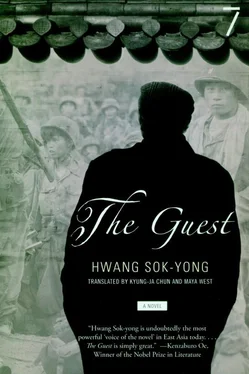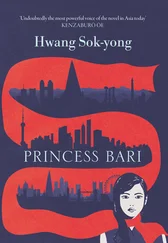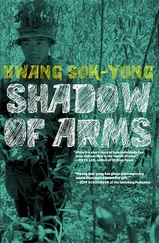Well, well! If it isn’t the deacon!
I was so panicked and frightened that I didn’t recognize him at first. He was wearing a military uniform, complete with field jacket, not to mention a cartridge belt and gun at his waist. It was one of those American guns that we used to call “Chickenheads.”
It’s me, Pongsu! Remember? I used to live here.
Finally, it clicked. This man with the pomaded hair combed all the way back — this man was the eldest son of the miller. He’d gotten into some deep trouble back home, after liberation. His father crossed the thirty-eighth parallel and went down South fairly early on, and all their land, including the mill and the brewery, had been confiscated. Until that day, I’d had no idea that he even knew Yohan. Just then, out of nowhere, Yohan stuck his face out from the sea of young men.
Uncle, you know Presbyter Choi Jang-no from the church in town, don’t you?
Sure. we’ve. held revival services together, I answered vaguely, wanting to get out of there.
Pongsu joined in, You’re still under forty, aren’t you?
Yes, that’s right.
Well, then you should join the Youth Corps. We need to form a branch of the Taeha Youth Corps here in our hometown.
Feigning inattention, I simply served the rice. The roar of conversation kept going strong as the men began to eat.
Hey, whatever happened to that guy who started the peacekeeping troops in your village?
You mean Ri Sunnam?
That’s the one — he used to work as a handyman in the orchards, right?
Yohan finished that bastard yesterday.
Aw, c’mon — you guys should have left me my share — that son of a bitch was red through and through.
That was how I found out that my nephew Yohan had killed Sunnam. It’s true that people killed each other out of spite during those hellish days to get even. But you know, it’s also true that they all felt a kind of pressure to be merciless — they wanted their peers to think highly of them. If you showed any sign of weakness, if you had a single moment of indecision, well, then your whole ideology could be called into question. No one was to be trusted. There was even a joke that went around back then: that one’s a watermelon — no, he’s an apple — no, a persimmon — why, he’s a green melon — ah well, it doesn’t matter if he’s blue, red, blue dyed red, or red dyed blue — anything that’s got any color at all has got to go. When I went to clear the dishes after dinner, the young men in the meeting room were smoking. Sitting on a desk, Pongsu asked Sangho, Hey, Sangho, remember that guy who used to work as a foreman in my father’s factory?
Sure I do. Isn’t he the one that put your father through all that hell?
Whatever happened to that asshole?
Sangho snickered, We got him.
What about that piece of shit who was in charge of all the land reform in the northeastern districts?
Oh, that son of a bitch — you know, he’d actually made himself the chairman of the District Party Committee. We brought him in, too. Along with his whole family.
Pongsu hopped down from the desk. He kept touching the gun at his waist, grinning all the while, but I don’t think he even knew he was doing it. I wasn’t interested in being a spectator to such nonsense, so I hurried out of the room. Back in the kitchen I was washing dishes with the women when I heard someone crying out in pain in the backyard. Curiosity is strong enough to overcome fear, they say. Furtively, I wiped my hands on my pants and got up. One of the women looked at me.
Deacon, why bother? You don’t want to see what’s out there — whatever it is, you can be sure it’s no festival mask dance.
You just keep your eyes and your ears shut. I’m going to go sneak a peek.
We, at least, had simply been told to cook — we really had nothing to complain about. It was the men they recruited later on that had to do all the real dirty work. They were the ones who had to deal with the countless dead bodies of all the people being killed in the backyard of the police station and around the county hall. The air-raid shelter and the trench were packed with people by then, just waiting to die, with no food or water. For the first two days you could hear the kids crying, but after that everything fell silent — there wasn’t a single whimper. God only knows if they all dropped dead or what. Sometimes, when I walked by, I could see a couple of their heads poking up through the air shaft, which came up to about the height of my knees. Sir, please, give us some water, please, my child is dying of thirst. There were times I’d pass by, pretending I hadn’t heard a thing, but whenever I could I’d get a bucketful of water and pour it gently down the shaft.
The backyard of the county hall was just on the other side of a wooden fence. I stepped up on a rock to try and look over it, to see what was going on. Dusk was setting in and it was getting pretty dark. I could make out a group of people standing in a circle around two big, whitish objects. Looking more closely, I realized the pale things were two naked men. Pongsu had unbuckled the cartridge belt from his waist; he was whipping one of them with it.
You dirty son of a bitch, pay up! Cough up all the rent you owe us, everything you haven’t paid these past five years! Thief!
Abruptly, he turned to the other man and started beating him, too, shouting, And you! You were a fucking homeless piece of dirt and we took you in — we taught you, trained you to handle engines so you could make a living — and you have the nerve to tell us to give up our factory? The lowest mongrel is better than you! At least a dog knows to be grateful to its master!
Pongsu kept on thrashing them, his breath growing harsher with each passing moment. When one of the men, unable to take it anymore, made a run for it and tried to break through the human wall, the spectators kicked him back inside the circle.
Bring me some gasoline! It’s in the car! Pongsu shouted, panting.
When the gasoline arrived, he poured it all over the whitish shapes as they quivered on the ground. It looked like he was giving them a bath. Moving as one, the circle of men stepped back a few paces as Pongsu reached over to strike a match. Throwing the match, Pongsu, too, sprang backwards. A tower of flame shot straight up into the air. I jerked my eyes away from the crack in the wooden fence. That was the beginning — the beginning of the Judgment of Fire in the book of Revelation.

October 17. The U.S. Army arrives in the afternoon.
A regimental force of the First Armored Division moves into Chaeryŏng on its way north from Haeju. The main objective of their operation is to attack Pyongyang; they are not interested in mopping up the western regions. The temporary regimental headquarters stationed in Chaeryŏng dispatches search parties to Sinch’ŏn and Anak, which is located northwest of their route. A platoon led by Lieutenant Harrison of the U.S. Armed Forces advances to Sinch’ŏn. The regiment’s intelligence officer has informed them of the Rightist uprising in the area, so a separate squad is sent ahead, riding in a jeep, before they all march into town. Everyone is relieved to see the flag flying from the county hall flagpole, not to mention the banner with “Welcome” spelled out in English. Unaccompanied by any combat units, the main force rides into town along the new road. They are courteously shown into the meeting room in the county hall. In the yard, young men armed to the teeth and a crowd of what seems to be their families have gathered together to welcome them. The Americans stay in the town of Sinch’ŏn for two hours. They contact the regimental headquarters in Chaeryŏng and request that rations, some medicine, and, most importantly, munitions such as bullets and grenades be brought to Sinch’ŏn. Approximately fifteen hundred men have assembled so far, but only about a thousand of them are armed. The regular troops, American and South Korean, continue their march north. They do not return until they retreat again the following winter. After the welcoming rally is over, it is announced that the defeat of Communism and the unification of Korea has become a reality. In the county hall, the Taehan Youth Corps and the new Autonomous Police are established, and a ceremony is held the following morning in the front yard to celebrate. Once the festivities are complete, the men return their attention to the air-raid shelter and the trench. The executions begin.
Читать дальше













